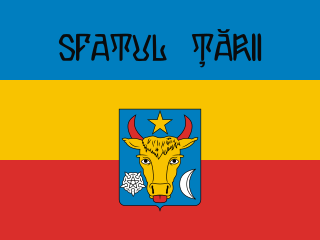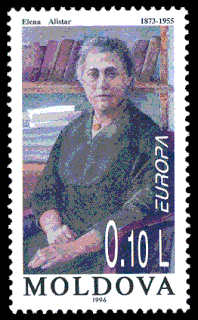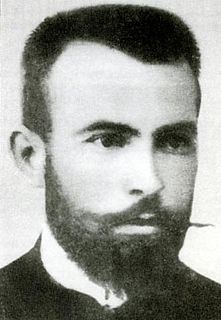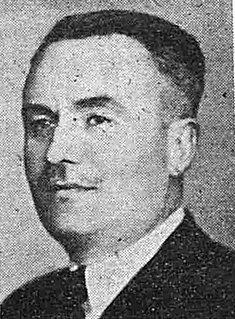 W
WSfatul Țării was a council that united political, public, cultural, and professional organizations in the greater part of the territory of the Governorate of Bessarabia in the disintegrating Russian Empire, which was transformed into a Legislative body and proclaimed the Moldavian Democratic Republic as part of the Russian Federative Republic in December 1917, and then union with Romania in April [O.S. March] 1918.
 W
WNicolae N. Alexandri was a Bessarabian politician.
 W
WElena Alistar-Romanescu was a Bessarabian physician and politician who was part of Sfatul Țării from Bessarabia.
 W
WAlexandru Baltagă was a Bessarabian Romanian Orthodox priest, a founder of the Bessarabian religious press in the Romanian language, a member of Sfatul Țării (1917–1918), a Soviet political prisoner, and, according to the Orthodox Church, a martyr for the faith.
 W
WPyotr Zakharovich Bazhbeuk-Melikov, also Bachbeouk-Melikoff, Bazhbeuk-Melikyan or Bazhbeuk-Melikishvili, was an ethnic Armenian politician and agronomist in Bessarabia. Educated in Tiflis Governorate and then in France, he had various administrative offices in the Russian Empire and the Russian Republic. He presented himself in the November 1917 election for the Russian Constituent Assembly as an affiliate of the Constitutional Democratic Party. Failing in this bid, Bazhbeuk was instead welcomed as an Armenian delegate by the Bessarabian assembly, or Sfatul Țării, just before the proclamation of a Moldavian Democratic Republic. Loyal toward the latter, he spoke out against Bolshevik infiltration, and asked for an intervention by the neighboring Kingdom of Romania. Though he welcomed the Romanian military expedition of early 1918, he found himself opposed to the subsequent union between Bessarabia and Romania, reverting to Russian monarchism.
 W
WVladimir Bodescu was a Bessarabian politician and lawyer who was part of the Moldovan Parliament from Bessarabia. He was one of the many victims of Soviet communism.
 W
WIon Alion Buzdugan was a Bessarabian-Romanian poet, folklorist, and politician. A young schoolteacher in the Russian Empire by 1908, he wrote poetry and collected folklore emphasizing Bessarabia's links with Romania, and associated with various founding figures of the Romanian nationalist movement, beginning with Ion Pelivan. Buzdugan was a far-left figure during the February Revolution, but eventually rallied with the National Moldavian Party in opposition to the socialists and the Bolsheviks. He vehemently supported the union of Bessarabia with Romania during the existence of an independent Moldavian Democratic Republic, and, as a member of its legislature, worked to bring it about. Threatened by the Bolsheviks, he fled to Romania and returned with an expeditionary corps headed by General Ernest Broșteanu, being one of the delegates who voted for the union, and one of dignitaries who signed its proclamation.
 W
WVasile Cijevschi was a Bessarabian and Romanian politician, administrator and writer. Originally a career officer in the Russian Empire, he was active within the ethnic Romanian political movement during the Russian Revolution, and later within the Moldavian Democratic Republic. Cijevschi helped organize the Republic's defense against leftist insurrection, and contributed to the Bessarabian–Romanian union of 1918. He is chiefly remembered as a supporter of Bessarabian identity within Romania and as an early critic of Romanian centralism.
 W
WNicolae Ciornei was a Bessarabian politician.
 W
WDaniel Ciugureanu was a Romanian politician from Bessarabia, deputy in Sfatul Țării from Chisinau, Prime minister of the Moldavian Democratic Republic from 29 January [O.S. 16 January] 1918 - 21 April [O.S. 8 April] 1918, Minister for Bessarabia in four Romanian Governments, Deputy and Senator, Vice-President of the Chamber of Deputies, Vice-President and President of the Senate of Kingdom of Romania.
 W
WIon T. Costin was a Moldovan politician.
 W
WAnton Crihan was a Bessarabian politician, lawyer, author, economist, professor and journalist, member of Sfatul Țării (1917), adviser to the Secretary of State for Agriculture in the General Directorate of the Republic of Moldova (1917), deputy in the Parliament of Romania, adviser to the Secretary of State at the Ministry of Agriculture and Domains (1932–1933), professor at the Polytechnic University of Iasi and at the Faculty of Agronomy in Chisinau (1934–1940).
 W
WSerghei Donico-Iordăchescu was a Bessarabian politician.
 W
WFelix Dudchievicz was a Bessarabian politician.
 W
WPantelimon Erhan was a Bessarabian politician and prime minister of the Moldavian Democratic Republic (1917–1918).
 W
WVasile Gafencu was a Bessarabian politician.
 W
WPantelimon "Pan" Halippa was a Bessarabian and later Romanian journalist and politician. One of the most important promoters of Romanian nationalism in Bessarabia and of this province's union with Romania, he was president of Sfatul Țării, which voted union in 1918. He then occupied ministerial posts in several governments, following which he underwent political persecution at the hands of the Communist régime and was later incarcerated in Sighet prison.
 W
WIon Harbuz was a Bessarabian politician.
 W
WIon C. Inculeț was a Bessarabian and Romanian politician, the President of the Country Council of the Moldavian Democratic Republic, Minister, full member of the Romanian Academy. He was buried in the Church of St. Ioan Botezătorul of Bârnova, located on the outskirts of Iași. He was married to Princess Roxana Cantacuzino. His children from this marriage were Ion I. Inculeț, Doctor Honoris Causa of the University of Western Ontario (Canada), NASA consultant, Honorary Member of the Romanian Academy, director of the Center of Applied Electrostatics of the University of Western Ontario, and his brother, George I. Inculeț.
 W
WTeofil Ioncu was a Bessarabian and Romanian politician, member of Sfatul Țării.
 W
WKrste Petkov Misirkov was a philologist, journalist, historian and ethnographer.
 W
WAnatolie Moraru was a Bessarabian politician.
 W
WGherman V. Pântea was a Bessarabian-born soldier, civil servant and political figure, active in the Russian Empire and Romania. As an officer of the Imperial Russian Army during most of World War I, he helped organize the committees of Bessarabian soldiers, oscillating between loyalty to the Russian Provisional Government and the cause of Bessarabian emancipation. Pântea was subsequently Military Director of the Moldavian Democratic Republic, answering to President Ion Inculeț. He personally created a Bessarabian defense force, tasked with combating Bolshevik subversion and Russian intimidation, but also braced for defeat after the October Revolution.
 W
WIon Păscăluță was a Bessarabian politician.
 W
WIon Gheorghe Pelivan was a Romanian politician.
 W
WAndrei Scobioală (1884–1971) was a Bessarabian politician, a professor of mathematics and a deputy in the Country Council between 1917-1919 and in the Parliament of Romania between 1928 - 1930.
 W
WPantelimon V. Sinadino was a Bessarabian politician. He served as mayor of Chișinău. He was the grandson of Pantelimon I. Sinadino.
 W
WNicolae Șoltuz was a Bessarabian politician.
 W
WConstantin G. Stere or Constantin Sterea was a Romanian writer, jurist, politician, ideologue of the Poporanist trend, and, in March 1906, co-founder of the literary magazine Viața Românească. One of the central figures of the Bessarabian intelligentsia at the time, Stere was a key actor during the Union of Bessarabia with Romania in 1918, and is associated with its legacy.
 W
WVasile Vasilievici Stroescu, also known as Vasile de Stroesco, Basile Stroesco, or Vasile Stroiescu, was a Bessarabian and Romanian politician, landowner, and philanthropist. One of the proponents and sponsors of Romanian nationalism in Russia's Bessarabia Governorate, as well as among the Romanian communities of Austria-Hungary, he was also a champion of self-help and of cooperative farming. He inherited or purchased large estates, progressively dividing them among local peasants, while setting up local schools and churches for their use. An erudite and traveler, he abandoned his career in law to focus on his agricultural projects and cultural activism. For the latter work, he became an honorary member of the Romanian Academy.
 W
WVasile Ţanţu was a Bessarabian politician.
 W
WGheorghe Tudor was a Bessarabian politician.
 W
WIon Văluţă was a Bessarabian politician.